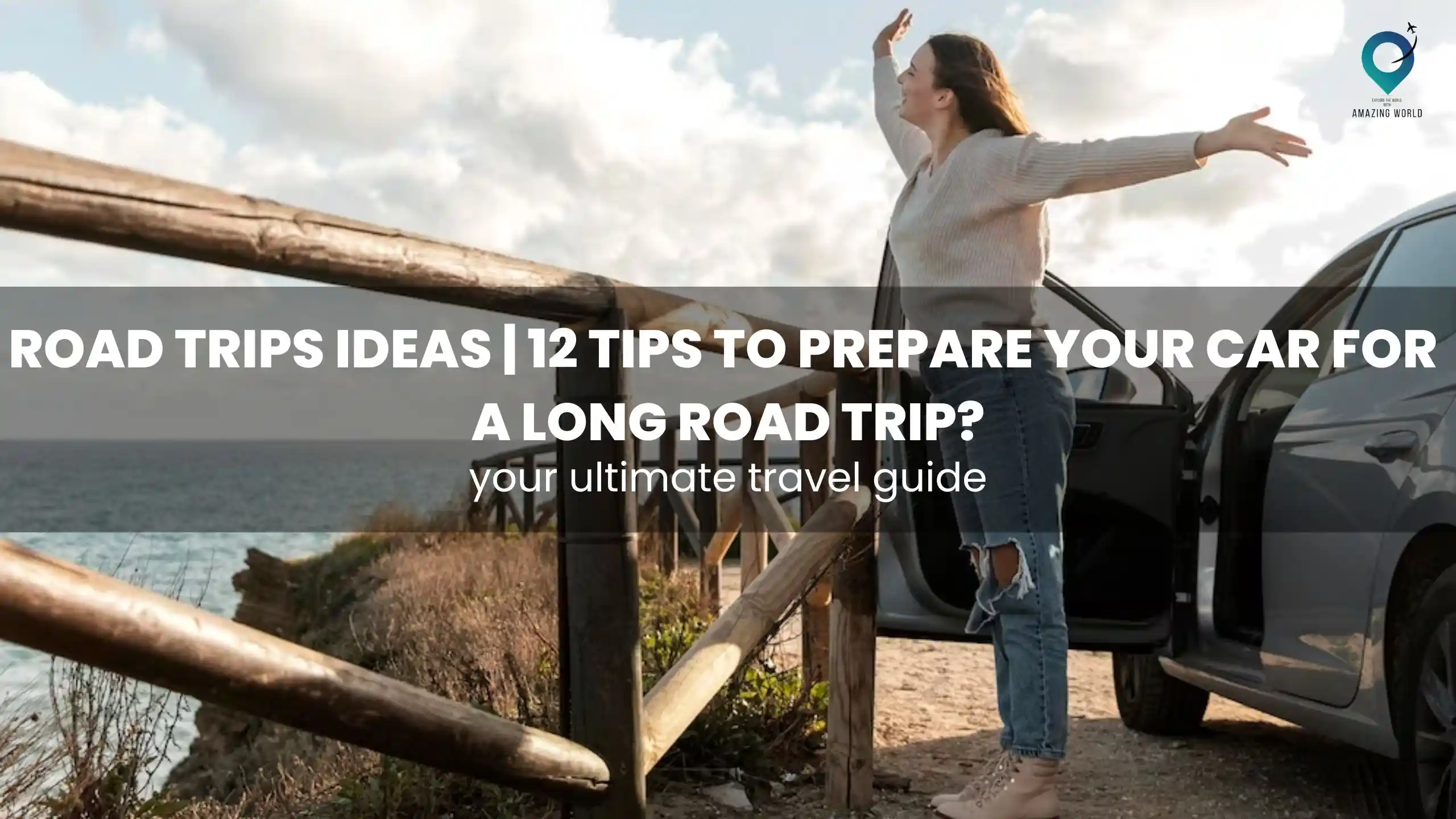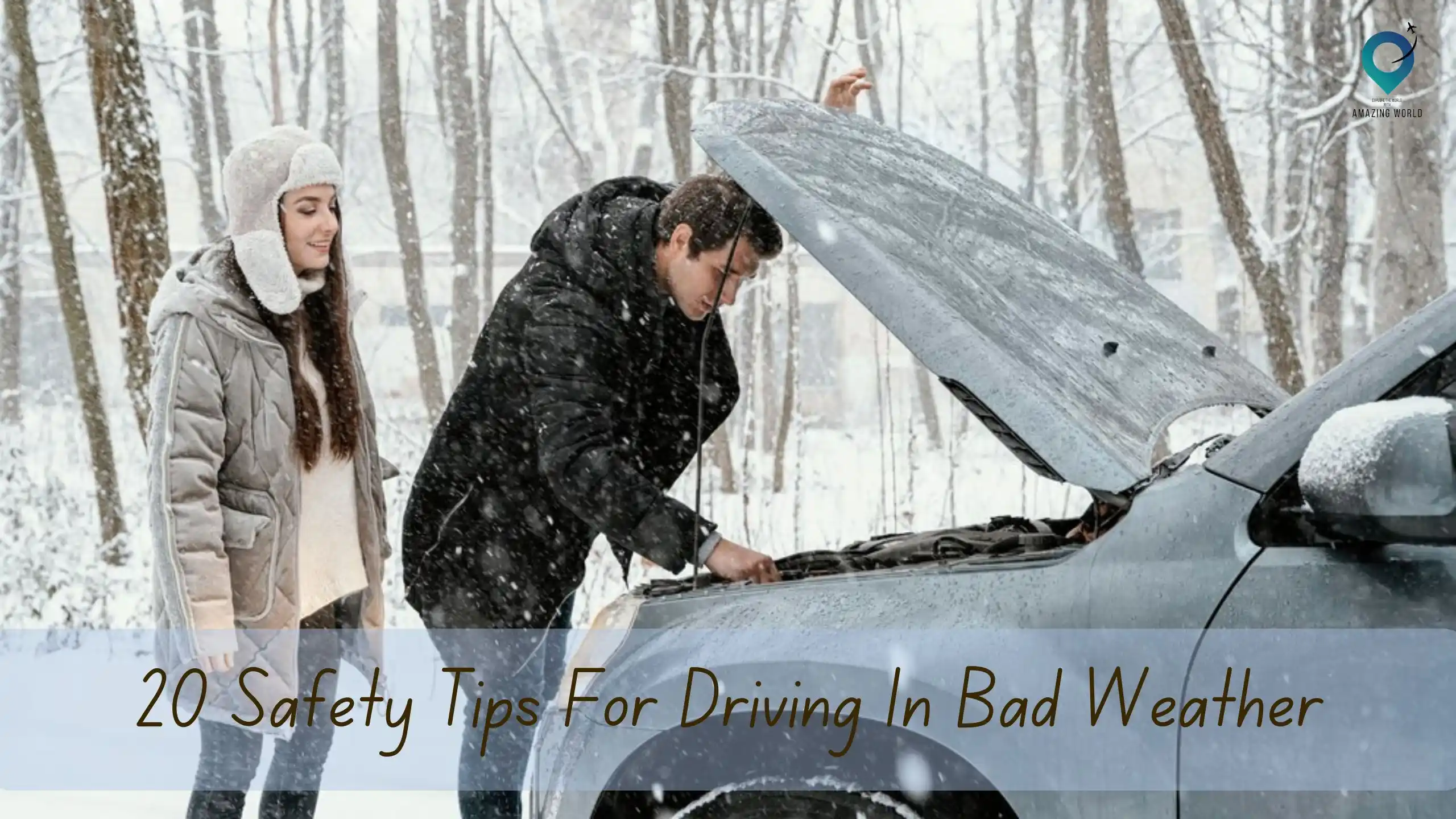Road Trips Ideas | 12 tips to prepare your car for a long road trip?
Table of Contents
ToggleAre you feeling restless and yearning for adventure after months of being cooped up at home due to the COVID-19 pandemic? If so, you’re not alone. The pandemic has forced many of us to put our travel plans on hold and stay close to home to stay safe. However, as vaccination rates rise and restrictions loosen, there’s a glimmer of hope on the horizon for travel enthusiasts. If you’re ready to hit the open road and embark on a long-awaited road trip, it’s important to take extra precautions and prepare accordingly.
In addition to the usual road trip preparations, such as ensuring your car is in good condition, packing an emergency kit, and planning your route, there are also new considerations to keep in mind, such as mask mandates, vaccination requirements, and social distancing guidelines.
Here At Amazingworld, we’ll share 12 tips to prepare your car for a long road trip in the age of COVID-19. Whether you’re a seasoned road warrior or a first-time road tripper, these tips will help you navigate the challenges of traveling during a pandemic and make the most of your journey. So, if you’re ready to break free from the confines of home and explore the world once again, pack your bags, buckle up, and let’s hit the road!
Check the tires

Checking your tires is an essential step in preparing your car for a long road trip. Before hitting the road, it’s important to ensure that your tires are in good condition to reduce the risk of problems on the road.
Here are some important things to consider when checking your tires:
- Tire pressure: Check the tire pressure using a tire gauge. The recommended tire pressure can usually be found in your vehicle’s owner’s manual or on a sticker inside the driver’s side door jamb. Ensure that each tire is inflated to the recommended pressure.
- Tread depth: Check the tread depth by placing a penny upside down in the tread groove. If you can see the top of Lincoln’s head, the tread is too worn and the tire should be replaced.
- Tire damage: Check the tires for any signs of damage, such as cuts, bulges, or punctures. If you notice any damage, have the tire inspected by a professional or replaced if necessary.
By checking your tires before your road trip, you can ensure that they are in good condition and reduce the risk of problems on the road. It’s important to remember to check your tires regularly throughout your trip, especially if you’ll be driving long distances, to ensure that they remain in good condition.
Change oil and filters

Changing the oil and filters is another important step in preparing your car for a long road trip. It’s important to ensure that your car has clean oil and filters to keep the engine running smoothly and efficiently.
Here are some important things to consider when changing your car’s oil and filters:
- Oil type: Check your car’s owner’s manual to determine the recommended type of oil for your vehicle. The type of oil you use can affect your car’s performance and fuel efficiency, so it’s important to use the recommended oil type.
- Oil level: Check your car’s oil level using the dipstick. Ensure that the oil level is between the minimum and maximum marks on the dipstick.
- Filters: Change the oil filter and air filter. The oil filter helps to remove contaminants from the oil, while the air filter helps to keep the engine’s air intake clean.
By changing your car’s oil and filters before your road trip, you can ensure that your engine is running smoothly and efficiently. It’s important to remember to check your oil level regularly throughout your trip and to change your oil and filters according to your car’s recommended schedule.
Check the brakes

Checking your brakes is an essential step in preparing your car for a long road trip. Brakes are a crucial safety feature of any vehicle, and it’s important to ensure that they’re in good working order before embarking on a long journey.
Here are some things to consider when checking your brakes:
- Brake pads: Check the thickness of your brake pads. Worn brake pads can reduce braking performance, which can be dangerous on a long road trip.
- Brake rotors: Check the condition of your brake rotors. Warped or worn rotors can cause vibrations and reduce braking performance.
- Brake fluid: Check the level and condition of your brake fluid. Low brake fluid levels or dirty fluid can cause your brakes to fail.
By checking your brakes before your road trip, you can ensure that they’re in good working order and will provide the stopping power you need. If you notice any issues with your brakes during your trip, such as unusual noises or reduced braking performance, it’s important to have them checked by a professional as soon as possible.
Check the battery

Your car battery is responsible for providing power to start your vehicle’s engine and to keep the electrical components running. Before heading out on a long road trip, it’s important to check your battery’s condition to ensure it’s in good shape.
Here are some things to consider when checking your battery:
- Visual inspection: Check the battery case for any signs of damage or corrosion. If you see any visible damage, it’s best to replace the battery before your trip.
- Battery age: Check the age of your battery. Typically, car batteries last between 3-5 years. If your battery is older than 5 years, it’s best to replace it before your trip.
- Battery charge: Check the battery charge level. If your battery is low on charge, it may not start your vehicle or provide enough power for your trip.
By checking your car battery before your road trip, you can avoid the inconvenience of a dead battery and ensure that you have reliable power to start your engine and run your electrical components.
Check fluids

Checking the fluids in your car is a crucial part of preparing for a long road trip. The fluids in your car help to keep the engine and other components running smoothly. Here are the fluids you should check:
- Engine oil: Check your engine oil level and make sure it’s at the recommended level. If it’s low, top it off, or consider changing the oil if it’s due for a change.
- Transmission fluid: Check your transmission fluid level and make sure it’s at the recommended level. If it’s low, top it off or consider changing the fluid if it’s due for a change.
- Coolant: Check your coolant level and make sure it’s at the recommended level. If it’s low, add coolant to bring it to the correct level.
By checking your fluids before your road trip, you can avoid potential engine damage or breakdowns.
Check lights

Checking your car lights is another important step in preparing for a long road trip. Your car lights help to keep you safe and visible to other drivers on the road. Here are the lights you should check:
- Headlights: Check that both of your headlights are working properly and are properly aimed.
- Taillights: Check that both of your taillights are working properly.
- Brake lights: Check that both of your brake lights are working properly.
By checking your lights before your road trip, you can avoid potential accidents and keep yourself and other drivers on the road safe.
Pack an emergency kit

When going on a long road trip, it’s important to be prepared for the unexpected. That’s why you should pack an emergency kit to keep in your car. Here are some items to consider including:
- First aid kit: In case of any injuries or medical emergencies, having a first aid kit can be extremely helpful.
- Jumper cables: If your car battery dies, having jumper cables can allow you to jump-start your car.
- Flashlight: If you have car trouble at night, a flashlight can help you see what’s going on and signal for help
- Blanket: If you get stranded or stuck somewhere, a blanket can help keep you warm.
- Snacks and water: In case you get stranded or stuck in traffic, having non-perishable snacks and water can help keep you fed and hydrated.
By packing an emergency kit, you can be prepared for any unexpected situations that may arise on your road trip.
Pack tool kit

It’s always a good idea to have a basic tool kit in your car when going on a road trip. Here are some tools you might want to consider packing:
- Lug wrench: This tool is used to loosen and tighten lug nuts on your car’s wheels.
- Screwdrivers: A flathead and Phillips head screwdriver can be useful for tightening or loosening screws on your car or other items.
- Pliers: Pliers can be used to grip and twist wires, nuts, and bolts. Example: Pack a set of slip-joint pliers or needle-nose pliers.
- Duct tape: Duct tape can be used to temporarily fix a variety of car problems, like a cracked windshield or a broken bumper.
- Tire pressure gauge: It’s important to check your tire pressure regularly, especially on long road trips.
By packing a basic tool kit, you can be prepared for small repairs or adjustments that may need to be made during your road trip. However, if you’re not comfortable making a repair yourself, don’t hesitate to seek the help of a professional mechanic.
Plan the route

Planning your route before embarking on a road trip is essential for a stress-free journey. Here are some tips for planning your route:
- Choose your destinations: Decide on the places you want to visit during your trip and plot them on a map.
Example: If you’re planning a road trip through California, you might want to visit San Francisco, Los Angeles, and San Diego.
- Consider the time of year: Some roads may be closed due to weather conditions, so be sure to check the weather forecast and any road closures before you depart.
Example: If you’re planning a road trip in the winter, you might want to avoid mountain passes that could be affected by snow.
- Break up the journey: Plan to take regular breaks to avoid driver fatigue and to allow for sightseeing.
Example: If you’re driving from New York City to Miami, you might plan to stop overnight in Washington D.C., and Charleston, South Carolina.
- Use online tools: There are plenty of online tools available to help you plan your route, such as Google Maps or Roadtrippers. Example: Use Google Maps to get an estimated travel time and to see any potential traffic delays along your route.
By planning your route in advance, you can avoid getting lost, minimize the chances of running into unexpected road closures, and ensure that you don’t miss out on any must-see sights along the way.
Check the weather and road conditions

Checking the weather and road conditions is an important step to take before heading out on a road trip. This will help you to avoid any potential hazards such as heavy rain, snow, or ice.
It’s also important to check for any road closures or detours due to construction or other factors that could impact your journey. By taking a few minutes to check the weather and road conditions before your trip, you can stay safe and avoid any unexpected delays or problems.
Check insurance coverage

Checking your insurance coverage is an important step to take before embarking on a road trip. This will ensure that you have the necessary coverage in case of an accident or other unforeseen events on the road. Before you depart, review your policy to make sure that you have adequate coverage for your vehicle and passengers. Consider adding roadside assistance or other optional coverage if you plan on driving in remote or unfamiliar areas.
It’s also a good idea to carry a copy of your insurance policy and contact information for your insurance provider in case of an emergency. By checking your insurance coverage before your trip, you can have peace of mind and enjoy your journey without worrying about any unexpected expenses or issues.
Keep vehicle clean and organized

Keeping your vehicle clean and organized is not only important for your own comfort but also for your safety on the road. A cluttered and dirty vehicle can distract the driver and make it difficult to find important items when you need them. Here are some tips for keeping your vehicle clean and organized:
- Dispose of trash regularly: Make it a habit to throw away trash as soon as possible to avoid clutter and odors in your vehicle.
- Use organizers and storage containers: Use storage containers and organizers to keep items like maps, snacks, and electronics neatly stored and within reach.
- Vacuum and clean regularly: Regularly vacuum and clean the interior of your vehicle to keep it free of dirt, dust, and debris that can accumulate over time.
- Keep emergency supplies easily accessible: Store emergency supplies such as a first aid kit, flashlight, and water in a designated spot where they can be easily accessed in case of an emergency.
By keeping your vehicle clean and organized, you can create a safer and more comfortable environment for yourself and your passengers while on a long road trip.
Conclusion.
Preparing your vehicle for a long road trip is essential for a successful and stress-free journey. From a full vehicle inspection to packing emergency supplies, there are many steps you can take to ensure your vehicle is ready for the road.
It is important to prioritize safety and comfort when planning a road trip, especially during the COVID-19 pandemic. With proper preparation and planning, you can enjoy the open road with peace of mind knowing that your vehicle is in good condition and ready for anything.
How much did you like Our detailed Road Trips Ideas | 12 Tips to Prepare Your Car for a Long Road Trip?? Review Also, please share these Blogs with your friends on social media.

Meet David Hoper, a passionate travel Blog writer with 7+ years of experience in travel content. Through his exemplary storytelling and engaging narratives, he shares his experiences and brings destinations to life. With a keen eye for detail and a love for exploration, he has cultivated a diverse portfolio of travel blogs that inspire and inform readers worldwide.








